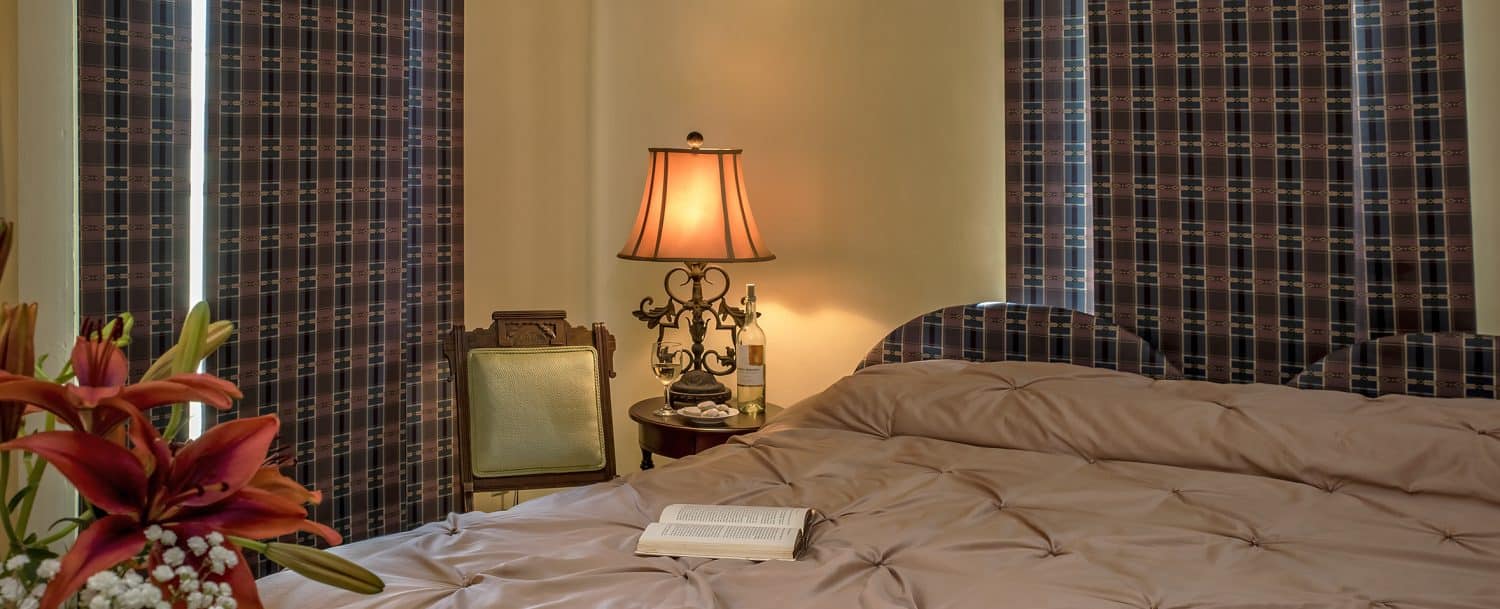Being that Dorothy lived in the 1920’s, this room captures the art deco feeling of the period. The room is classically decorated with the round mirrors, dresser and window treatments that cast a glow over this cozy corner room.
Dorothy Parker (1893-1967) represented one of the most accomplished feminists and successful literary writers in women’s history. She became known as one of the most brilliant writers from the early 1900s. Born in West End, New Jersey, and attaining her success from New York, she became one of the most brilliant writers that revolutionized American thinking then and after. Dorothy Parker lived a full and prosperous life, even though she did not have a happy childhood. Growing up, having bad relationships with her father and stepmother, she never had the privilege of growing up with a mother. Her mother died on July 20, 1897, when Dorothy was only four years of age, and her father died shortly after on December 28, 1913. Right before the death of her father was the passing away of her “brother Henry, who died on the passage home from a vacation with his wife Lissie aboard a first class steamship the Titanic, which sank in 1912.” As a sad woman, stung with depression and alcoholism her entire adult life, she had a successful and productive life. In 1916, at the age of 23, she joined the editorial staff of Vogue. Then in 1917 she started working as a theater critic for Vanity Fair, which had published her first poem entitled “Any Porch,” (1914).
Vanity Fair became a significant variable in her life in that she met the associates with whom she would form the Algonquin Round Table/Vicious Circle, an intellectual and renowned literary circle. Because of unfair reasons, Dorothy was let go from her position at Vanity Fair; at which time her colleague and later her closest confidant, Robert Benchley, also resigned. Parker and Benchley then became partners in a writing firm called “Park-Bench.” At a luncheon in the Algonquin Hotel, they met an elite group of intellectuals who became part of their literary circle. Similar to the “Radical Women of Greenwich Village,” she portrayed the liberated feminist of the 1900s. The Algonquin Round Table exemplified one of her most brilliant and accomplished achievements, for this brought together the most brilliant literary writers of that time, including Robert Benchley, Robert E. Sherwood, James Thurber, George S. Kaufman, Edna Ferber, Franklin P. Adams, and many others.
ROOM FEATURES:
- King bed
- Private bathroom with neo-angled shower
- Original sink and faucets
- Monogrammed bathrobes
- Warm bathrobes available upon request
- Gilchrist and Soames bath amenities
- Hairdryer
- Complimentary high-speed wireless internet throughout room and common areas
- Flat Screen TV
- Roku
- CD Player
- Ice bucket with 2 wine glasses
- Corkscrew opener
- Iron and ironing board
- Wake-up service
- Daily housekeeping service (Year-Round)
- 24-hour access to complimentary drinks- hot chocolate, hot tea, and coffee
- Access to our public library for our guests only. Check out each book is necessary at front desk
- Located on 1st floor
- Free off-street parking (Sept. 1st- June 20th)
The Spencer Hotel & Spa is the #1 rated Chautauqua, NY hotel on TripAdvisor, and the best place to stay for those visiting to enjoy the Chautauqua Institution’s year-round programming. Imagine hearing your favorite speaker or the symphony play while relaxing in comfortable chairs on our porches overlooking the Amphitheater. Our guests enjoy the perfect location and modern conveniences within a whimsical literary-themed setting that encourages relaxation and renewal, including:
- The only building on campus with a full-service elevator
- The only hotel on campus with central air conditioning
- Central location allowing only our guests the ability to hear everything in the Amphitheater from our porches
- For those who love the lake our location provides a 1 block walk
- On-site restorative cedar sauna
- 3 Course hot home cooked breakfast served daily is included in the room
- Use of parlor with fireplace, easy chairs, loveseats, and projector
- 4 stories of porches with tables and chairs for all
You may sit on ANY porch at any time! Your place on the porch is waiting!
Occupancy: This room accommodates 2 people
Bed Sizes: King bed
*Please note, during Chautauqua Summer Season (last Saturday in June through the last Saturday in August) rooms are rented by the week, from Saturday to Saturday. We are open year-round and welcome 2-nights during the rest of the year.
Full week stays during the 9-week Chautauqua Season includes breakfast every day. The Spencer can also assist guests in arranging travel insurance to cover unforeseen circumstances that may cause a guest to cancel their reservation.

